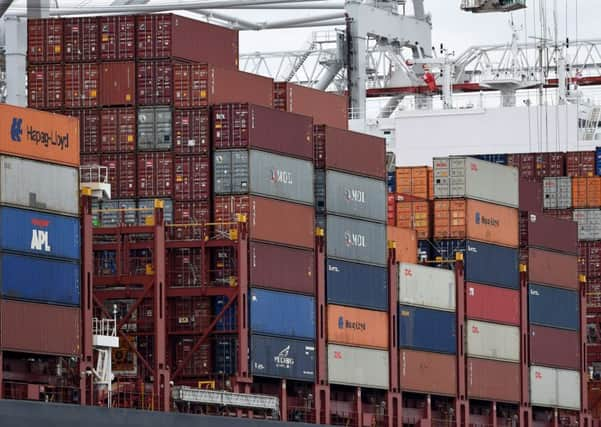Trade deficit widens as falling pound fails to help
This article contains affiliate links. We may earn a small commission on items purchased through this article, but that does not affect our editorial judgement.


The UK’s deficit on trade in goods and services rose to £5.1 billion, up from £4.2bn in May, the Office for National Statistics said.
Imports increased £1.9bn to reach a record high of £48.9bn, while exports lifted by just £1bn. The UK is looking to bolster its trade with the rest of the globe to help drive economic growth after voting to leave the European Union.
Advertisement
Hide AdAdvertisement
Hide AdHowever, the latest figures show that the UK exported £12bn worth of goods and services to the European Union in June, an increase of £500 million compared with May.
Economists have predicted British exports will rise following sharp falls in the value of the pound since the Brexit vote, making UK goods more attractive to overseas buyers.
But Samuel Tombs, chief UK economist at Pantheon Macroeconomics, said: “The latest trade figures underline that it takes years, not months, for exchange rate depreciations to boost GDP growth. Despite sterling’s depreciation, which began in November, the trade deficit widened. Looking ahead, the trade deficit likely will remain bloated in the near-term, as sterling’s depreciation will continue to make imports dearer.”
The disappointing figures come alongside weak manufacturing figures, with output down 0.3 per cent in June, slightly worse than economists’ expectations of a 0.2 per cent dip, though an improvement on the 0.6 per cent contraction in May.
Tombs added: “We fear that the trade boost could take even longer than usual to materialise this time, because exporters will be very reluctant to invest until the UK’s future trade arrangements are known. In short, hopes that exports will surge and offset the Brexit hit to domestic demand seem misplaced.”
Despite manufacturing’s continued malaise, activity in the wider industrial production sector was better, rising 0.1 per cent month-on-month in June compared with a 0.6 per cent fall in May.
Industrial production also recorded its strongest performance since 1999 in the three months to June – rising 2.1 per cent following a 0.2 per cent fall in the preceding quarter.
Andrzej Szczepaniak, UK economist at Barclays, said: “Our view is industrial production and manufacturing remains a concern.”
